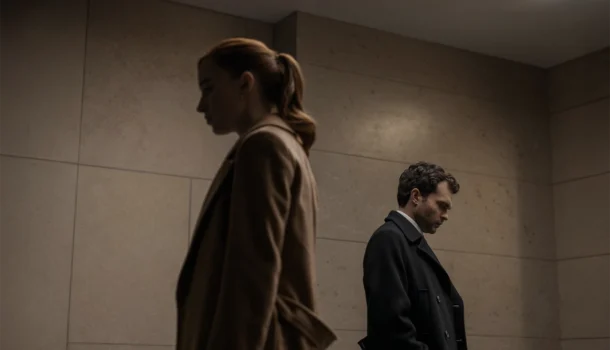In this fertile ground for normalized abuses, “Fair Play,” by Chloe Domont, is inserted as a fiction that wounds by its closeness to reality. The film, far from dealing with distant themes, infiltrates everyday life and lays bare how the patriarchal structure hides beneath the surface of intimacy. In a world that still resists accepting women as equals, the film tightens the exact point where love and power collide, revealing the fragility of an affection that cannot survive parity.
The plot builds from an apparently banal premise, but soon turns into an abyss: Emily and Luke, young lovers, live in New York and share not only their home but the same professional arena — the financial market, where the corporate jungle demands more than talent, it demands survival. Both nurture dreams that drive them forward until Emily is promoted to manager, a position Luke had sought. From that moment, harmony gives way to mistrust. Emily, now Luke’s superior, must deal not only with the demands of the job but with the emotional dismantling of the one who shares her bed.
Emily’s dilemma transcends workplace tension. Her rise triggers a discomfort that corrodes the foundation of the relationship, not from lack of love, but from an excess of unresolved power. Luke’s admiring gaze becomes critical scrutiny, admiration yields to vigilance. Every gesture of Emily’s is examined, every decision becomes ammunition. What should have been mutual celebration turns into a minefield, where female success is interpreted as an affront to masculinity. Chloe Domont captures this metamorphosis with precision: Emily’s journey is not just professional, it is a path of resistance in the face of continual attempts at erasure.
While Emily tries desperately to preserve the delicate line between work and personal life, Luke surrenders to a self-destructive spiral. There are no outbursts or explosions; there is the silence loaded with resentment, the small daily sabotages, the gestures that wound without leaving visible marks. Luke does not need to shout to dominate — it is enough to deny, to withdraw, to cast doubt. And when confronted, he resorts to sordid insinuations, suggesting that Emily’s rise resulted from favors exchanged with superiors. The violence here is not physical but lies in carefully chosen words that erode the emotional security of one who dared to ascend.
Domont, with sharp direction, portrays not only Luke’s fragility but the strength Emily must summon not to be destroyed. While the film exposes the external pressures of an oppressive corporate environment, it also lays bare the internal weight of a relationship based on appearances. The narrative is not content with mere denunciation; it asks: what sustains a relationship when traditional roles are reversed? How far can equality be lived before becoming intolerable?
As the film progresses, the pace intensifies, not through spectacular twists, but through the almost imperceptible escalation of tension. The home, once a refuge, becomes hostile ground. Emily resists, not as an unbeatable heroine, but as a real woman, weary of the concessions that no longer suffice to appease Luke’s thirst for control. The psychological thriller is built not on grand acts, but on the accumulation of small daily deaths — of dialogue, of desire, of trust.
This transformation of intimate space into a stage of oppression reveals one of the film’s greatest qualities: its ability to reflect society with a level of discomfort that extends beyond the screen. Luke is not a monster but a mirror. And it is this proximity to reality that makes the film not only necessary but urgent. It forces us to confront the structures that uphold male control over women, even in the most private and emotional spaces.
This is not merely a narrative about a couple in crisis, but a meticulous portrait of what happens when a woman breaks the expectation of submission and refuses to remain the silent supporter. Emily challenges, by her very existence, the logic that assigns men the role of leader, even if the cost is to endure the slow collapse of a love that no longer sees her as equal, but as a threat. Domont, by refusing to soften this reality, offers viewers an uncomfortable mirror, where social wounds take on an intimate contour.
“Fair Play” transcends the limits of conventional drama by sparking a reflection on male resistance to equity. Dynevor and Ehrenreich’s talent lends brutal authenticity to the plot, and Domont’s precise direction guides the viewer along a path where discomfort becomes a tool of critique. More than provocation, the film demands a stance: after all, what price are we willing to pay to maintain structures that no longer uphold the dignity of all?
Film: Fair Play
Director: Chloe Domont
Year: 2023
Genres: Drama/Romance/Thriller
Rating: 8/10

